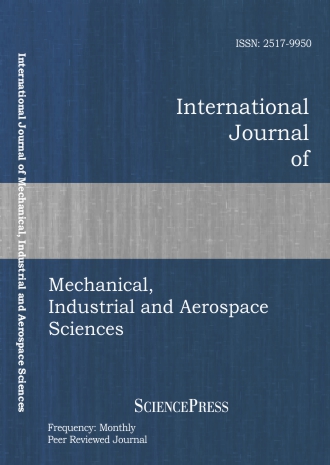
Scholarly
Volume:5, Issue: 2, 2011 Page No: 507 - 513
International Journal of Mechanical, Industrial and Aerospace Sciences
ISSN: 2517-9950
Cold Flow Investigation of Primary Zone Characteristics in Combustor Utilizing Axial Air Swirler
This paper presents a cold flow simulation study of a small gas turbine combustor performed using laboratory scale test rig. The main objective of this investigation is to obtain physical insight of the main vortex, responsible for the efficient mixing of fuel and air. Such models are necessary for predictions and optimization of real gas turbine combustors. Air swirler can control the combustor performance by assisting in the fuel-air mixing process and by producing recirculation region which can act as flame holders and influences residence time. Thus, proper selection of a swirler is needed to enhance combustor performance and to reduce NOx emissions. Three different axial air swirlers were used based on their vane angles i.e., 30°, 45°, and 60°. Three-dimensional, viscous, turbulent, isothermal flow characteristics of the combustor model operating at room temperature were simulated via Reynolds- Averaged Navier-Stokes (RANS) code. The model geometry has been created using solid model, and the meshing has been done using GAMBIT preprocessing package. Finally, the solution and analysis were carried out in a FLUENT solver. This serves to demonstrate the capability of the code for design and analysis of real combustor. The effects of swirlers and mass flow rate were examined. Details of the complex flow structure such as vortices and recirculation zones were obtained by the simulation model. The computational model predicts a major recirculation zone in the central region immediately downstream of the fuel nozzle and a second recirculation zone in the upstream corner of the combustion chamber. It is also shown that swirler angles changes have significant effects on the combustor flowfield as well as pressure losses.